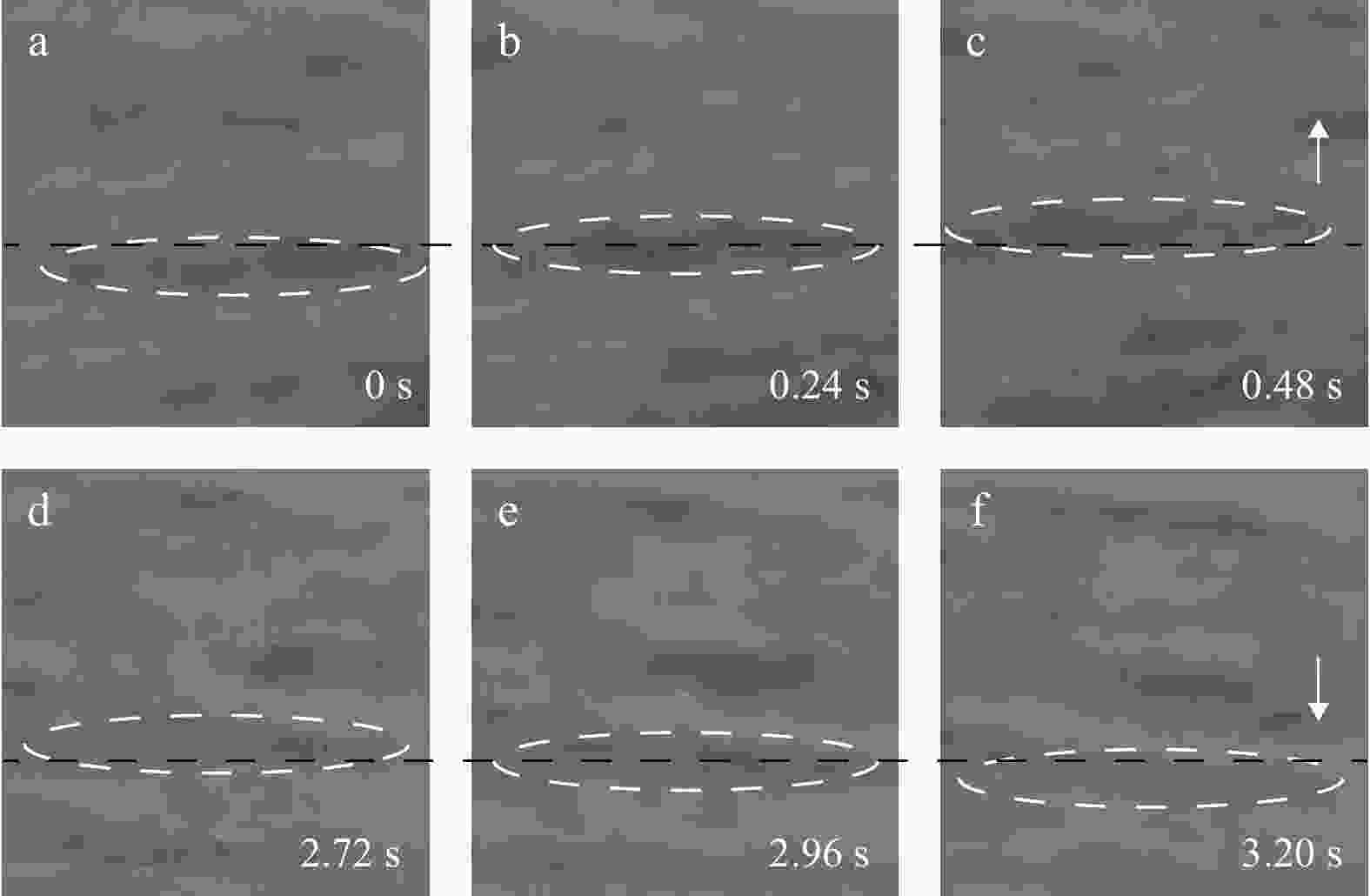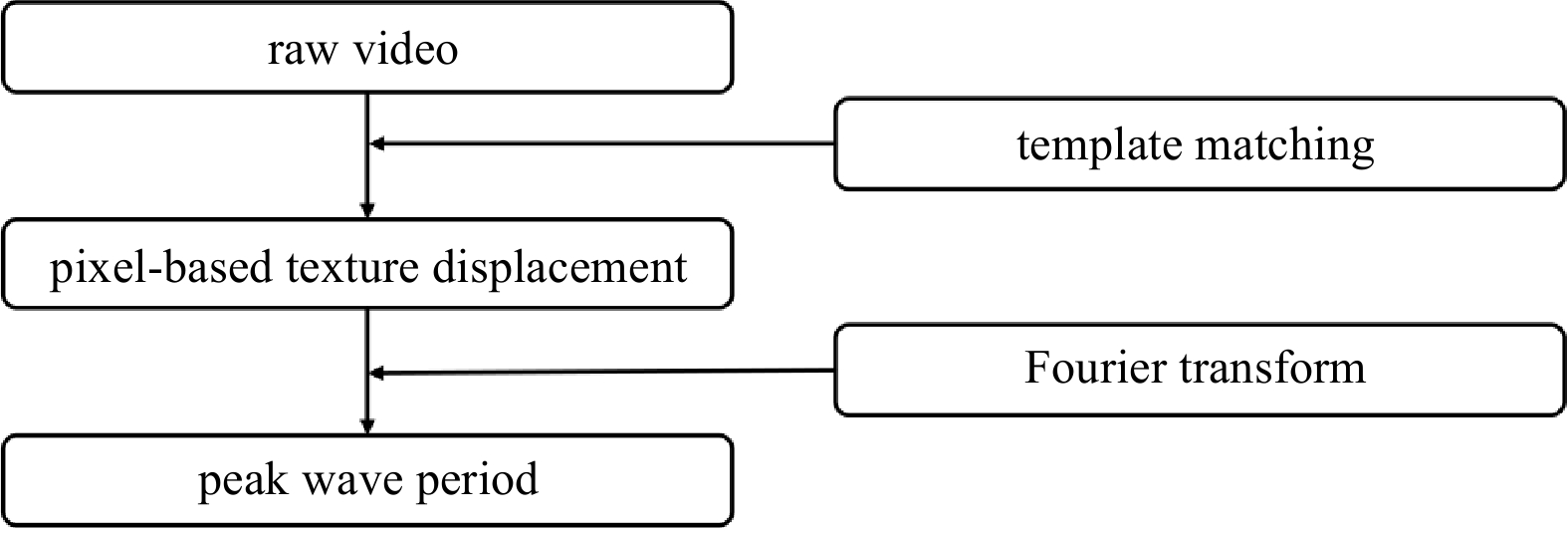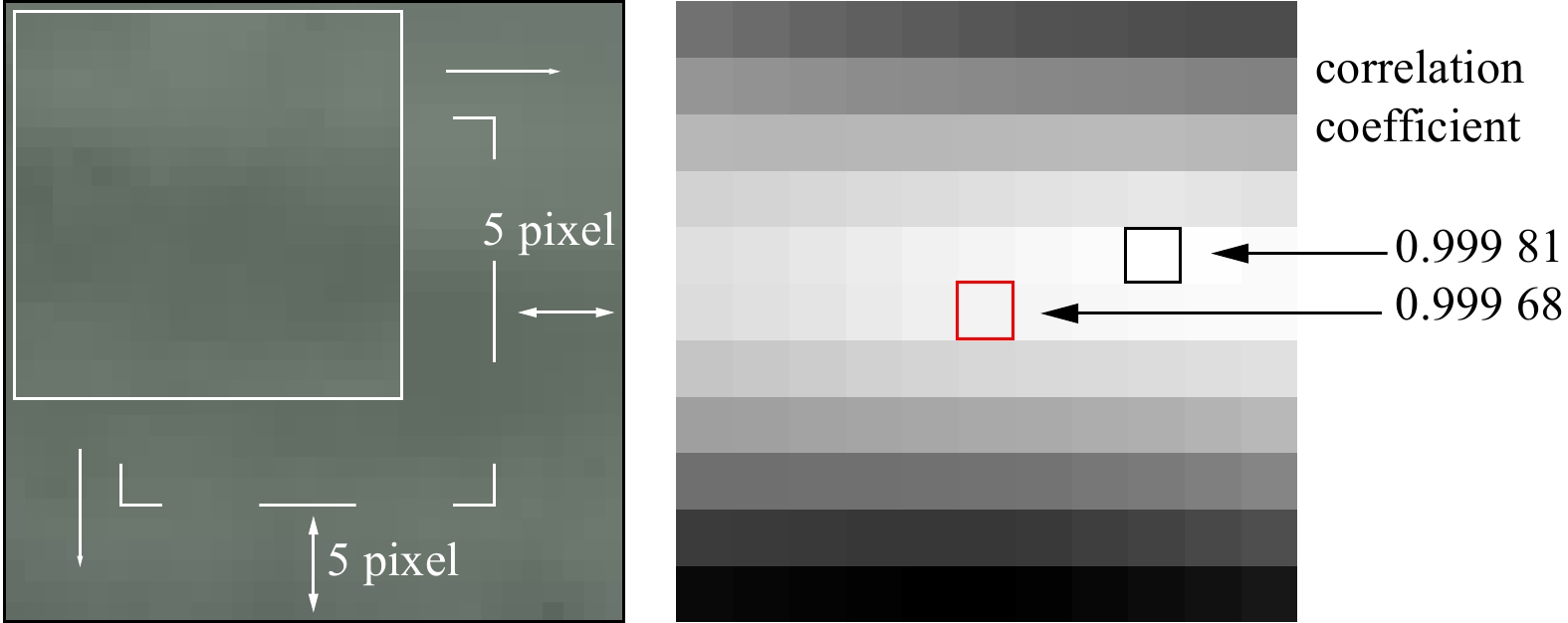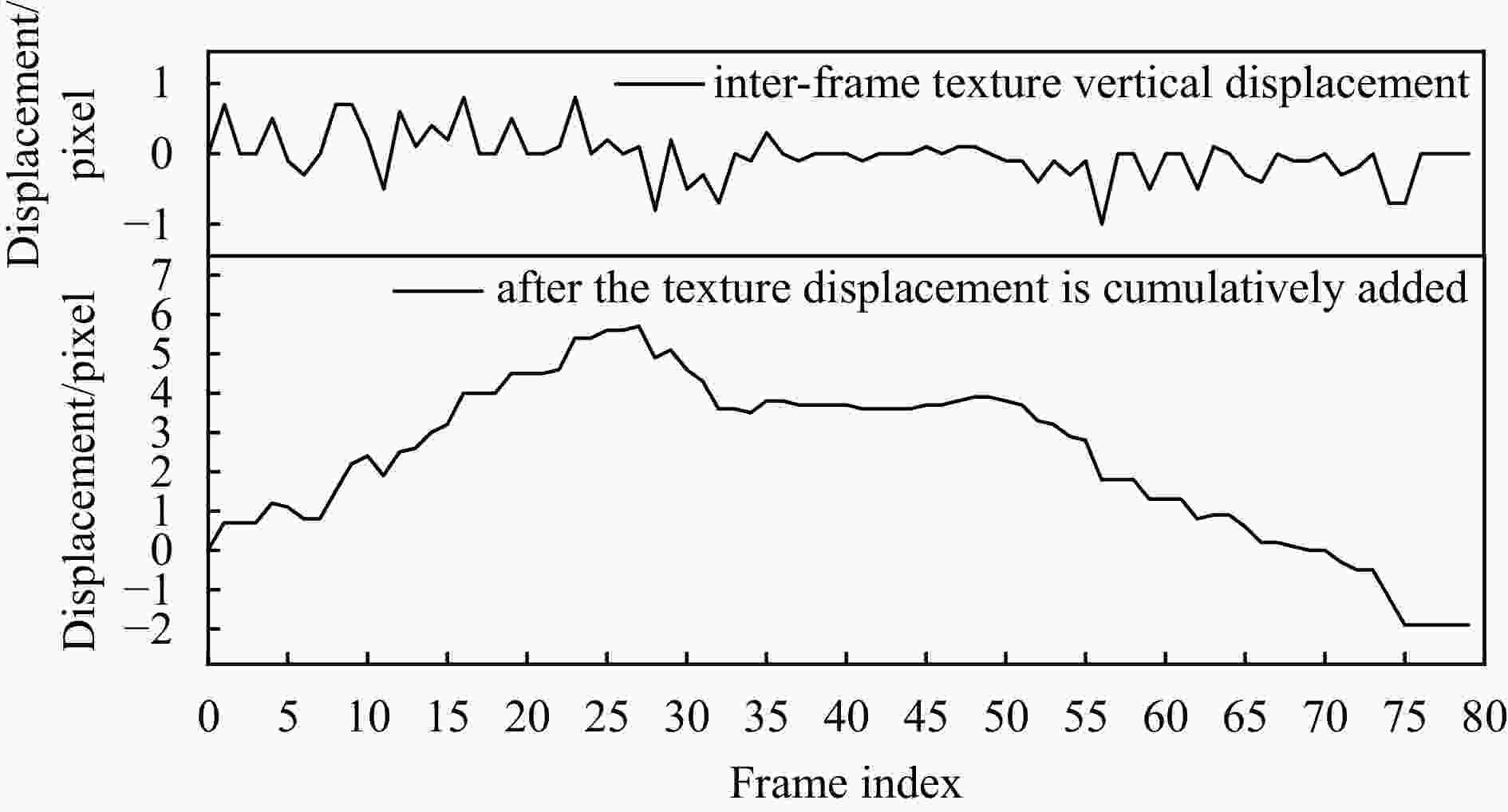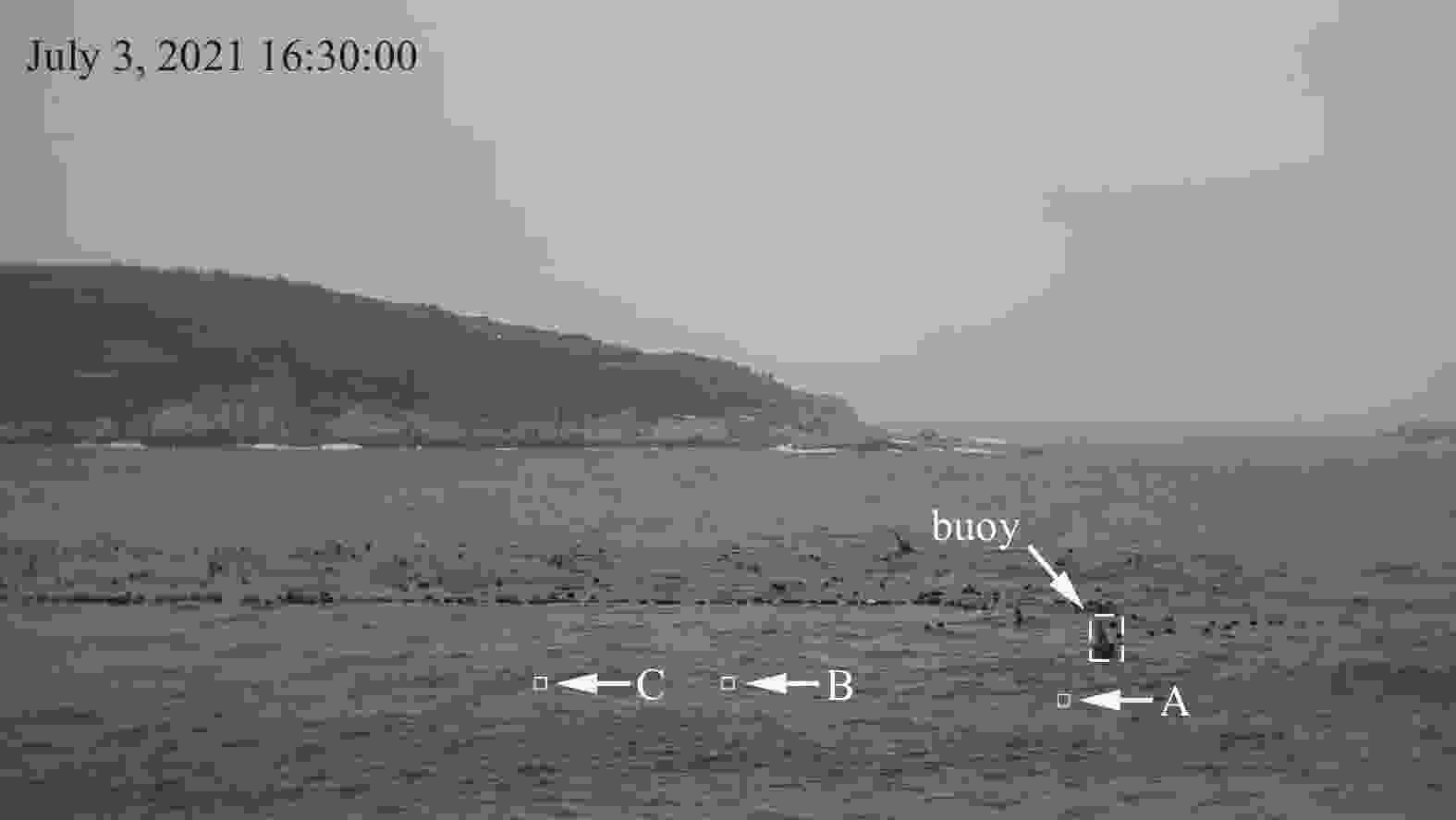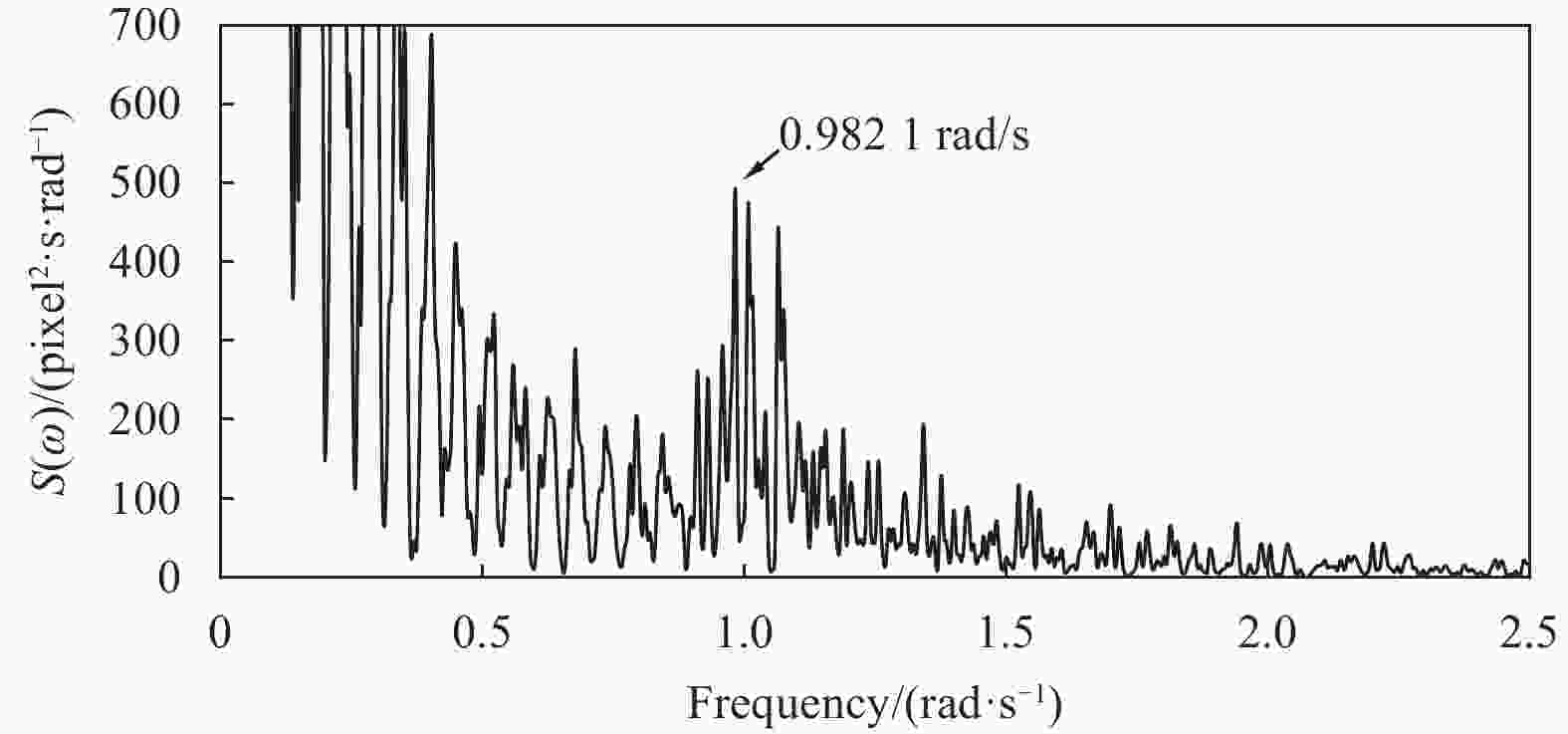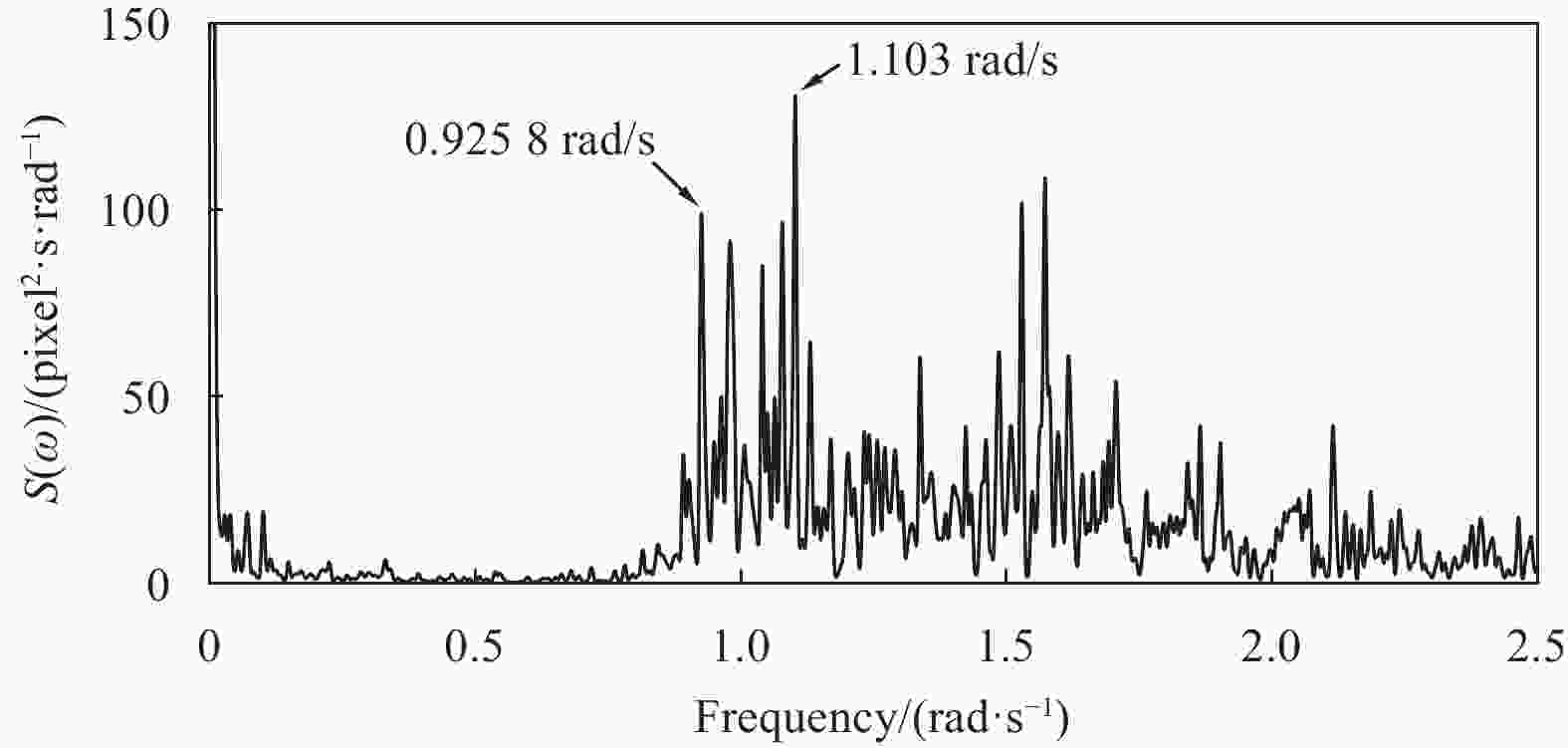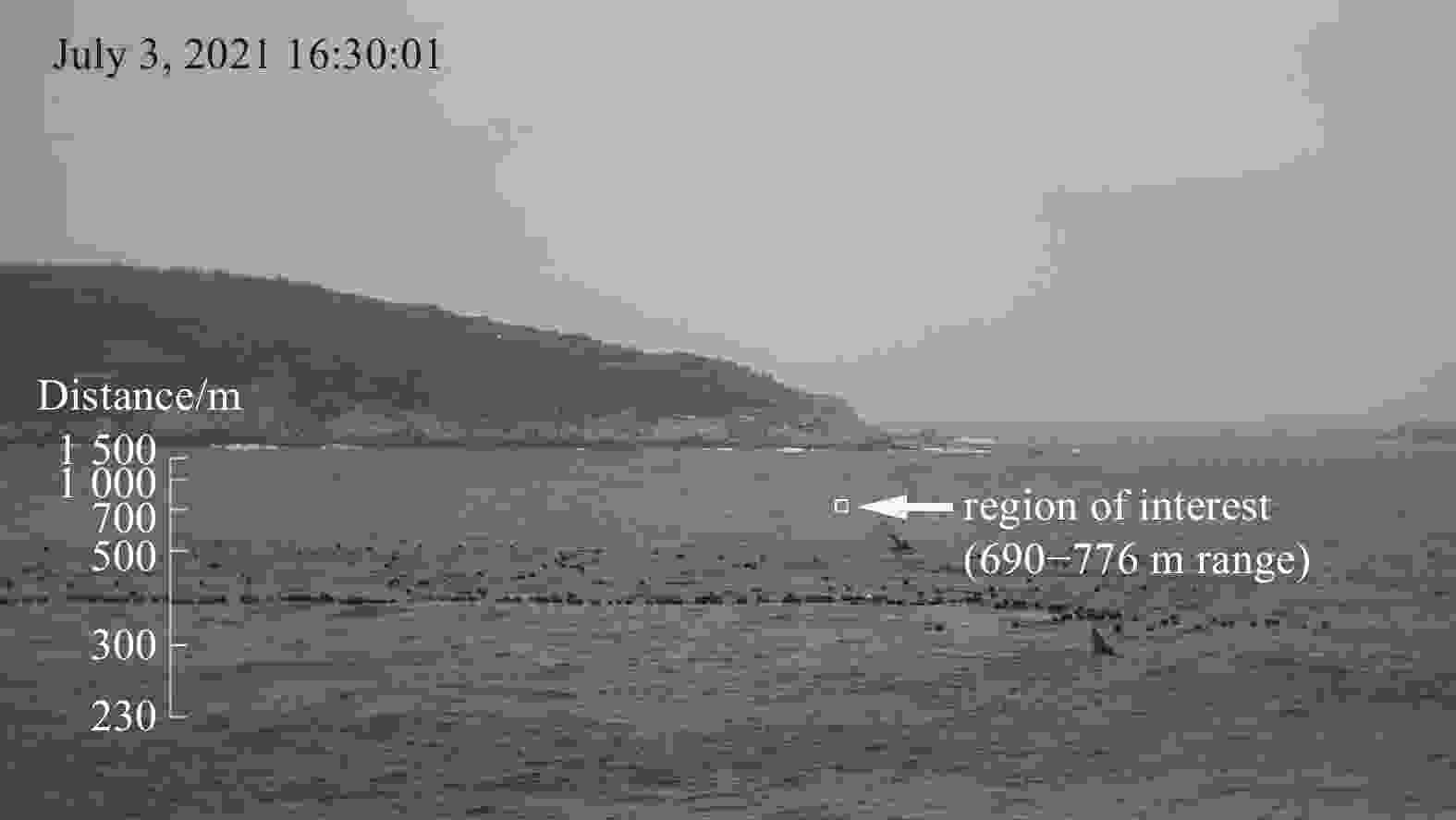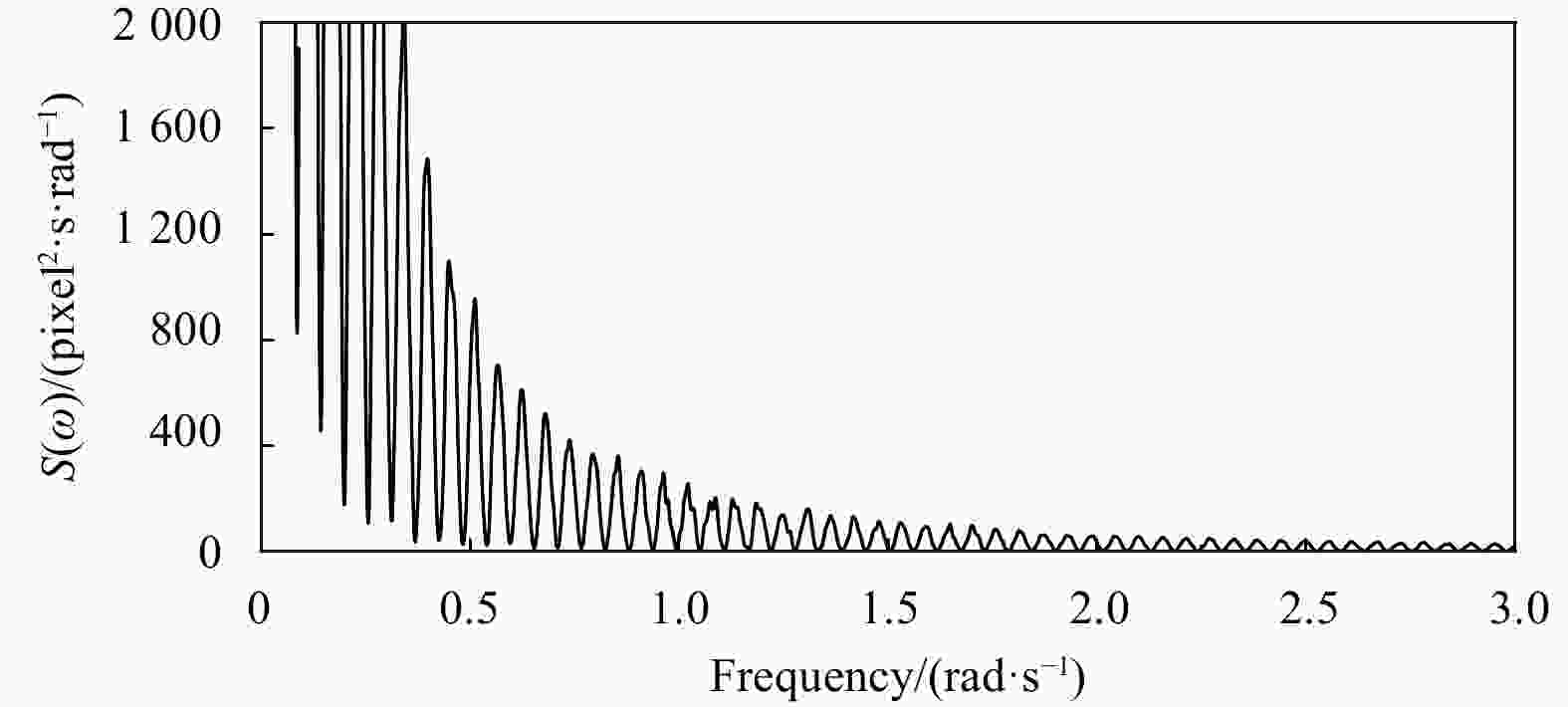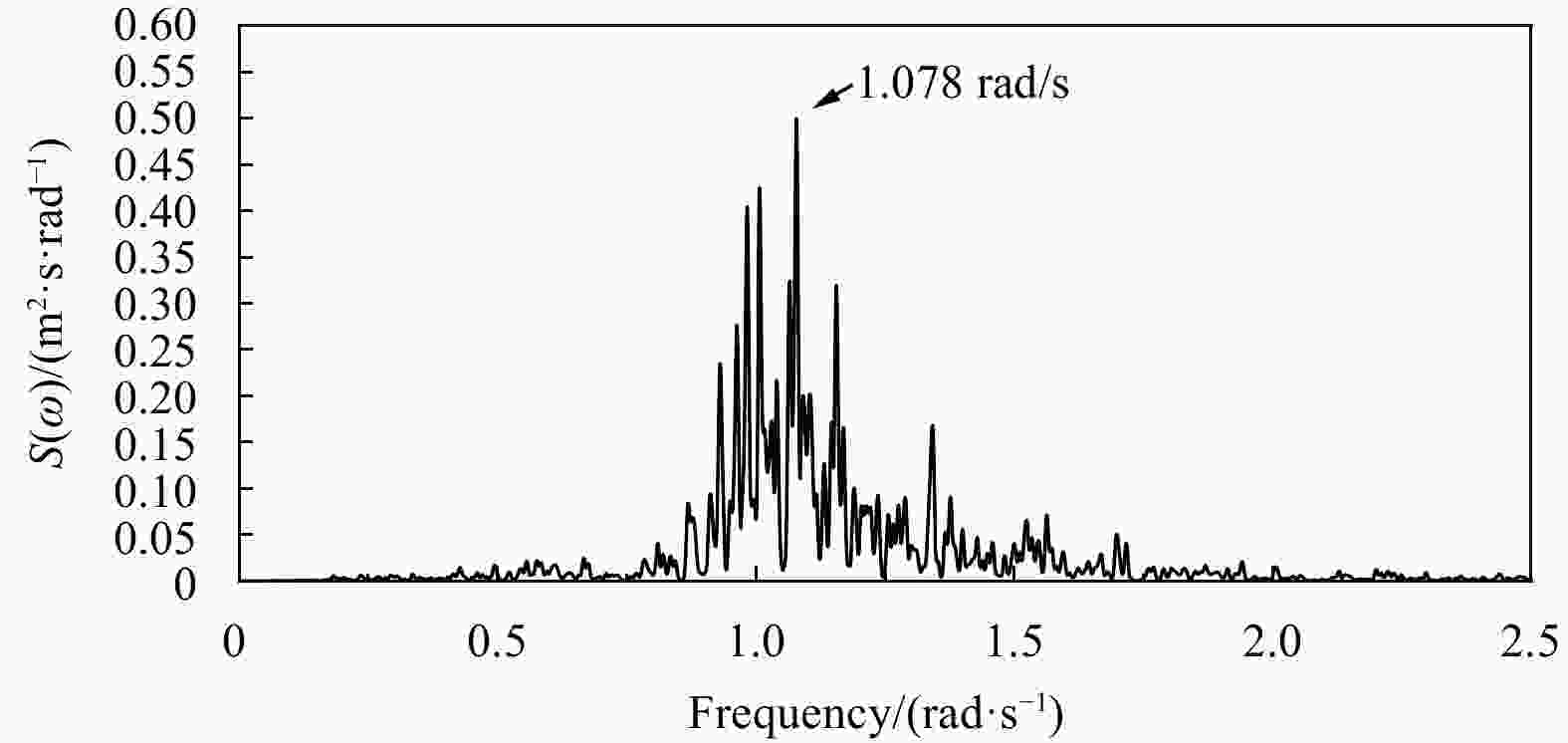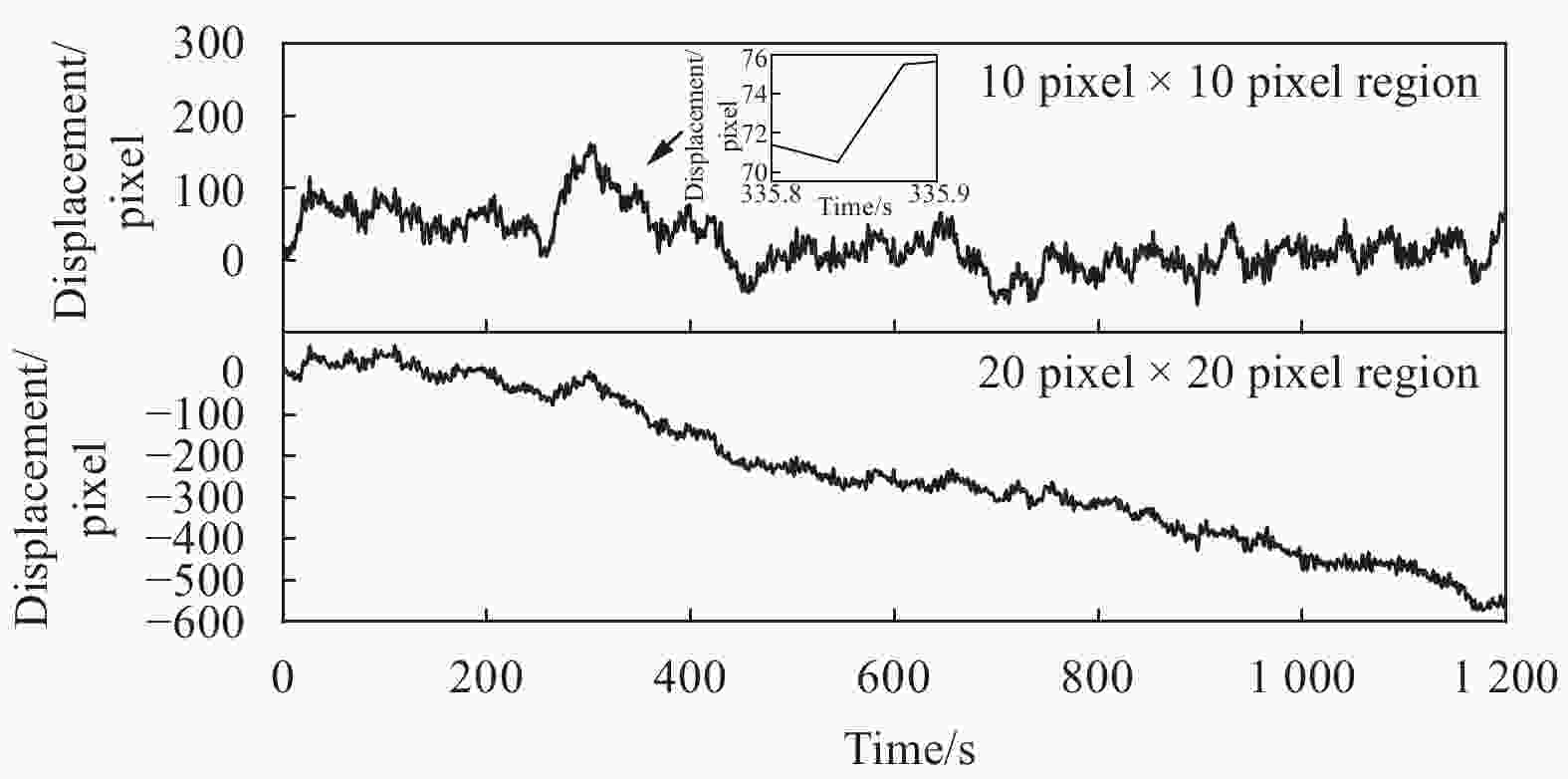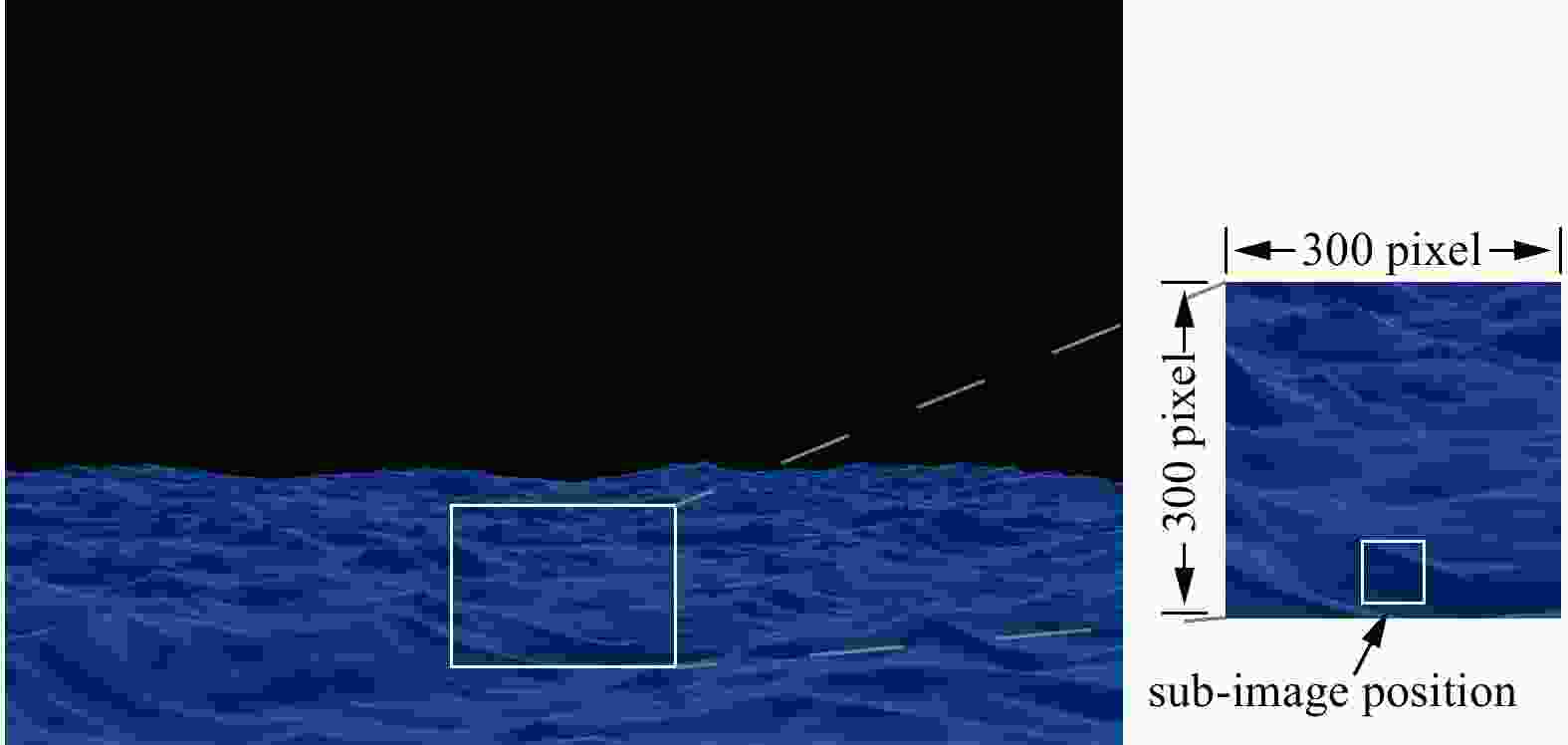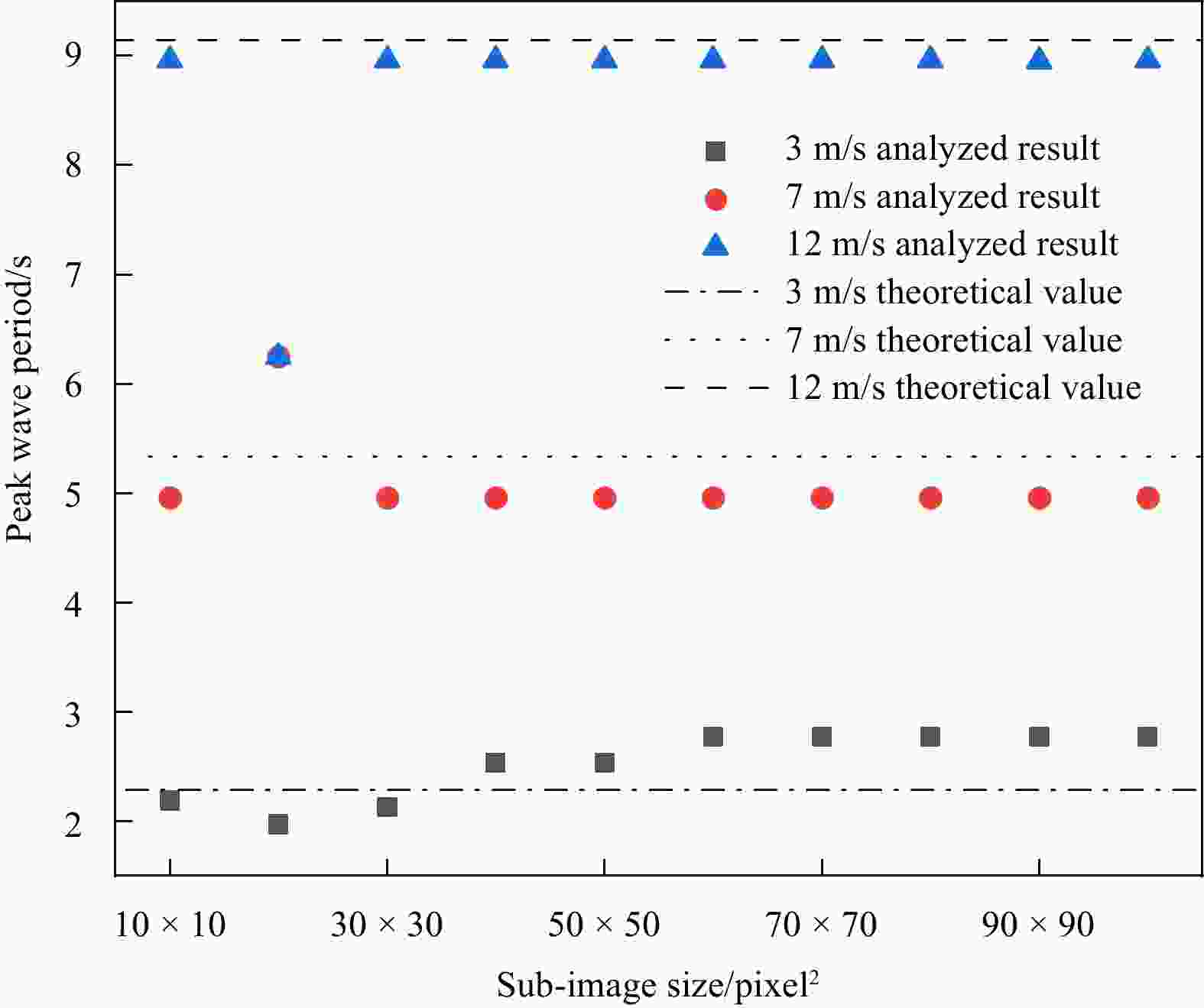-
Abstract: Wave information retrieval from videos captured by a single camera has been increasingly applied in marine observation. However, when the camera observes ocean waves at low grazing angles, the accurate extraction of wave information from videos will be affected by the interference of the fine ripples on the sea surface. To solve this problem, this study develops a method for estimating peak wave periods from videos captured at low grazing angles. The method extracts the motion of the sea surface texture from the video and obtains the peak wave period via the spectral analysis. The calculation results captured from real-world videos are compared with those obtained from X-band radar inversion and tracking buoy movement, with maximum deviations of 8% and 14%, respectively. The analysis of the results shows that the peak wave period of the method has good stability. In addition, this paper uses a pinhole camera model to convert the displacement of the texture from pixel height to actual height and performs moving average filtering on the displacement of the texture, thus conducting a preliminary exploration of the inversion of significant wave height. This study helps to extend the application of sea surface videos.
-
Key words:
- low grazing angle /
- sea surface texture /
- video /
- peak wave period /
- significant wave height /
- image matching
-
Figure 2. Sub-images of six moments taken from the video. The white dashed ellipse indicates the position of the ripple texture in the image, and the black dashed line serves as a reference baseline for observing the movement of the texture. The textures in the image show upward (a, b, c) and downward (d, e, f) movement as the waves pass by.
Table 1. Peak wave periods TA, TB, and TC corresponding to Regions A, B, and C in Fig. 6, respectively, along with the radar-derived peak wave period Tradar and the peak wave period Tbuoy extracted from buoy motion, during 16:30 to 16:50 (UCT+8) on July 3, 2021
TA/s TB/s TC/s Tradar/s Tbuoy/s 6.40 6.52 5.82 6.06 5.70 Table 2. Comparison of peak wave periods derived from image matching method Timage, radar inversion Tradar, and buoy motion analysis Tbuoy, and the deviations of Timage relative to Tradar (Dradar) and Tbuoy (Dbuoy)
Date and time (UCT+8) Timage/s Tradar/s Dradar Tbuoy/s Dbuoy 2021-07-03 08:30–08:50 6.04 6.46 6.5% 6.04 0.0% 2021-07-03 10:30–10:50 6.01 5.97 0.7% 6.02 0.2% 2021-07-03 11:30–11:50 5.72 5.96 4.0% 5.34 7.1% 2021-07-03 12:30–12:50 5.72 6.04 5.3% 6.43 11.0% 2021-07-03 13:30–13:50 6.18 6.20 0.3% 6.04 2.3% 2021-07-03 15:30–15:50 6.13 6.20 1.1% 6.04 1.5% 2021-07-03 18:30–18:50 6.21 5.91 5.1% 6.15 1.0% 2021-06-02 15:50–16:10 6.21 6.63 6.3% 7.01 11.4% 2021-06-09 09:50–10:10 6.02 6.12 1.6% 5.50 9.5% 2021-06-15 15:00–15:20 6.37 6.73 5.3% 6.26 1.8% 2021-07-04 17:00–17:20 6.39 6.35 0.6% 6.76 5.5% Table 3. Peak wave period Tp and significant wave height H1/3 corresponding to pixel sizes from 10 × 10 to 100 × 100 for sub-images
Size Tp/s H1/3/m 10 pixel × 10 pixel 5.83 0.92 20 pixel × 20 pixel 6.40 0.98 30 pixel × 30 pixel 6.40 0.96 40 pixel × 40 pixel 6.40 0.93 50 pixel × 50 pixel 6.40 0.92 60 pixel × 60 pixel 6.40 0.91 70 pixel × 70 pixel 6.40 0.89 80 pixel × 80 pixel 6.40 0.87 90 pixel × 90 pixel 5.90 0.86 100 pixel × 100 pixel 6.19 0.84 -
Afzal M S, Kumar L. 2022. Propagation of waves over a rugged topography. Journal of Ocean Engineering and Science, 7(1): 14–28, doi: 10.1016/j.joes.2021.04.004 Ahn S, Haas K A, Neary V S. 2020. Wave energy resource characterization and assessment for coastal waters of the United States. Applied Energy, 267: 114922, doi: 10.1016/j.apenergy.2020.114922 Alberello A, Bennetts L G, Onorato M, et al. 2022. Three-dimensional imaging of waves and floes in the marginal ice zone during a cyclone. Nature Communications, 13(1): 4590, doi: 10.1038/s41467-022-32036-2 Almar R, Bergsma E W J, Catalan P A, et al. 2021. Sea state from single optical images: A methodology to derive wind-generated ocean waves from cameras, drones and satellites. Remote Sensing, 13(4): 679, doi: 10.3390/rs13040679 Ardhuin F, Stopa J E, Chapron B, et al. 2019. Observing sea states. Frontiers in Marine Science, 6: 124, doi: 10.3389/fmars.2019.00124 Arefin M A, Saeed M A, Akbar M A, et al. 2022. Analytical behavior of weakly dispersive surface and internal waves in the ocean. Journal of Ocean Engineering and Science, 7(4): 305–312, doi: 10.1016/j.joes.2021.08.012 Battjes J A, Groenendijk H W. 2000. Wave height distributions on shallow foreshores. Coastal Engineering, 40(3): 161–182, doi: 10.1016/S0378-3839(00)00007-7 Bay H, Ess A, Tuytelaars T, et al. 2008. Speeded-up robust features (SURF). Computer Vision and Image Understanding, 110(3): 346–359, doi: 10.1016/j.cviu.2007.09.014 Benetazzo A. 2006. Measurements of short water waves using stereo matched image sequences. Coastal Engineering, 53(12): 1013–1032, doi: 10.1016/j.coastaleng.2006.06.012 Bergamasco F, Benetazzo A, Yoo J, et al. 2021. Toward real-time optical estimation of ocean waves’ space-time fields. Computers & Geosciences, 147: 104666, doi: 10.1016/j.cageo.2020.104666 Bergamasco F, Torsello A, Sclavo M, et al. 2017. WASS: An open-source pipeline for 3D stereo reconstruction of ocean waves. Computers & Geosciences, 107: 28–36, doi: 10.1016/j.cageo.2017.07.001 Blenkinsopp C E, Bayle P M, Martins K, et al. 2022. Wave runup on composite beaches and dynamic cobble berm revetments. Coastal Engineering, 176: 104148, doi: 10.1016/j.coastaleng.2022.104148 Brodtkorb P A, Johannesson P, Lindgren G, et al. 2000. WAFO—A Matlab toolbox for analysis of random waves and loads. Paper presented at The Tenth International Offshore and Polar Engineering Conference. Washington, DC, USA. ISOPE 2000-GFC-02 Chaturvedi S K. 2019. A case study of tsunami detection system and ocean wave imaging mechanism using radar. Journal of Ocean Engineering and Science, 4(3): 203–210, doi: 10.1016/j.joes.2019.04.005 Cui He, Chen Jianyu, Cao Zhenyi, et al. 2022. A novel multi-candidate multi-correlation coefficient algorithm for GOCI-derived sea-surface current vector with OSU tidal model. Remote Sensing, 14(18): 4625, doi: 10.3390/rs14184625 Davison S, Benetazzo A, Barbariol F, et al. 2022. Space-time statistics of extreme ocean waves in crossing sea states. Frontiers in Marine Science, 9: 1002806, doi: 10.3389/fmars.2022.1002806 Falcon E, Mordant N. 2022. Experiments in surface gravity-capillary wave turbulence. Annual Review of Fluid Mechanics, 54(1): 1–25, doi: 10.1146/annurev-fluid-021021-102043 Goda Y. 2009. A performance test of nearshore wave height prediction with CLASH datasets. Coastal Engineering, 56(3): 220–229, doi: 10.1016/j.coastaleng.2008.07.003 Goncalves H, Corte-Real L, Goncalves J A. 2011. Automatic image registration through image segmentation and SIFT. IEEE Transactions on Geoscience and Remote Sensing, 49(7): 2589–2600, doi: 10.1109/TGRS.2011.2109389 Guimarães P V, Ardhuin F, Bergamasco F, et al. 2020. A data set of sea surface stereo images to resolve space-time wave fields. Scientific Data, 7(1): 145, doi: 10.1038/s41597-020-0492-9 Hao Yang, Tang Tao, Gao Chunhai. 2023. Train distance estimation in turnout area based on monocular vision. Sensors, 23(21): 8778, doi: 10.3390/s23218778 Holman R A, Stanley J. 2007. The history and technical capabilities of Argus. Coastal Engineering, 54(6/7): 477–491, doi: 10.1016/j.coastaleng.2007.01.003 Horn B K P, Schunck B G. 1981. Determining optical flow. Artificial Intelligence, 17(1–3): 185–203, doi: 10.1016/0004-3702(81)90024-2 Kim B O. 2005. Photography aided determination of video camera orientation in coastal environments. Journal of Coastal Research, (42): 352–362 Kim B O, Cho H Y. 2005. Image processing for video images of buoy motion. Ocean Science Journal, 40(4): 213–220, doi: 10.1007/BF03023521 Kim B O, Cho H Y, Lim D I, et al. 2008. Nearshore wave measurement using single-video images of buoy motions. Journal of Coastal Research, 246: 1481–1486, doi: 10.2112/07-0850.1 Kim J I, Hyun C U, Han H, et al. 2019. Evaluation of matching costs for high-quality sea-ice surface reconstruction from aerial images. Remote Sensing, 11(9): 1055, doi: 10.3390/rs11091055 Kim M, Lee S, Hong J W. 2022. Empirical estimation of the breaker index using a stereo camera system. Ocean Engineering, 265: 112522, doi: 10.1016/j.oceaneng.2022.112522 Li Jiangxia, Pan Shunqi, Chen Yongping, et al. 2022. Assessment of combined wind and wave energy in the tropical cyclone affected region: An application in China seas. Energy, 260: 125020, doi: 10.1016/j.energy.2022.125020 Lowe D G. 2004. Distinctive image features from scale-invariant keypoints. International Journal of Computer Vision, 60(2): 91–110, doi: 10.1023/B:VISI.0000029664.99615.94 Malila M P, Thomson J, Breivik Ø, et al. 2022. On the Groupiness and intermittency of oceanic whitecaps. Journal of Geophysical Research: Oceans, 127(1): e2021JC017938, doi: 10.1029/2021JC017938 Malliouri D I, Memos C D, Soukissian T H, et al. 2021. Assessing failure probability of coastal structures based on probabilistic representation of sea conditions at the structures’ location. Applied Mathematical Modelling, 89: 710–730, doi: 10.1016/j.apm.2020.08.001 Osorio A F, Montoya-Vargas S, Cartagena C A, et al. 2019. Virtual BUOY: A video-based approach for measuring near-shore wave peak period. Computers & Geosciences, 133: 104302, doi: 10.1016/j.cageo.2019.07.006 Palmsten M L, Brodie K L. 2022. The coastal imaging research network (CIRN). Remote Sensing, 14(3): 453, doi: 10.3390/rs14030453 Pan Hailang, Gao Peilin, Zhou Huicheng, et al. 2020. Roughness analysis of sea surface from visible images by texture. IEEE Access, 8: 46448–46458, doi: 10.1109/ACCESS.2020.2978638 Perugini E, Soldini L, Palmsten M L, et al. 2019. Linear depth inversion sensitivity to wave viewing angle using synthetic optical video. Coastal Engineering, 152: 103535, doi: 10.1016/j.coastaleng.2019.103535 Pierson Jr W J. 1954. An interpretation of the observable properties of ‘sea’ waves in terms of the energy spectrum of the Gaussian Record. Eos, Transactions American Geophysical Union, 35(5): 747–757, doi: 10.1029/TR035i005p00747 Rattanapitikon W. 2008. Verification of significant wave representation method. Ocean Engineering, 35(11/12): 1259–1270, doi: 10.1016/j.oceaneng.2008.03.008 Rattanapitikon W, Shibayama T. 2013. Verification and extension of goda formulas for computing representative wave heights transformation. Coastal Engineering Journal, 55(3): 1350009, doi: 10.1142/S0578563413500095 Spencer L, Shah M. 2004. Water video analysis. In: Proceedings of International Conference on Image Processing. Singapore: IEEE, 2705–2708, doi: 10.1109/ICIP.2004.1421662 Spencer L, Shah M, Guha R K. 2006. Determining scale and sea state from water video. IEEE Transactions on Image Processing, 15(6): 1525–1535, doi: 10.1109/TIP.2006.871102 Stilwell Jr D. 1969. Directional energy spectra of the sea from photographs. Journal of Geophysical Research, 74(8): 1974–1986, doi: 10.1029/JB074i008p01974 Tessendorf J. 2001. Simulating ocean water. In: Simulating nature: realistic and interactive techniques. SIGGRAPH, 3-1–3-26 Ti Zilong, Zhang Mingjin, Li Yongle, et al. 2019. Numerical study on the stochastic response of a long-span sea-crossing bridge subjected to extreme nonlinear wave loads. Engineering Structures, 196: 109287, doi: 10.1016/j.engstruct.2019.109287 Vieira M, Guimarães P V, Violante-Carvalho N, et al. 2020. A low-cost stereo video system for measuring directional wind waves. Journal of Marine Science and Engineering, 8(11): 831, doi: 10.3390/jmse8110831 Villas Bôas A B, Ardhuin F, Ayet A, et al. 2019. Integrated observations of global surface winds, currents, and waves: Requirements and challenges for the next decade. Frontiers in Marine Science, 6: 425, doi: 10.3389/fmars.2019.00425 Wu Lichung, Doong Dongjiing, Lai Jianwu. 2022. Influences of nononshore winds on significant wave height estimations using coastal X-band radar images. IEEE Transactions on Geoscience and Remote Sensing, 60: 1–11, doi: 10.1109/TGRS.2021.3077903 Ye Yuanxin, Bruzzone L, Shan Jie, et al. 2019. Fast and robust matching for multimodal remote sensing image registration. IEEE Transactions on Geoscience and Remote Sensing, 57(11): 9059–9070, doi: 10.1109/TGRS.2019.2924684 Yoo S, Kim N. 2023. Coarse alignment methodology of point cloud based on camera position/orientation estimation model. Journal of Imaging, 9(12): 279, doi: 10.3390/jimaging9120279 -




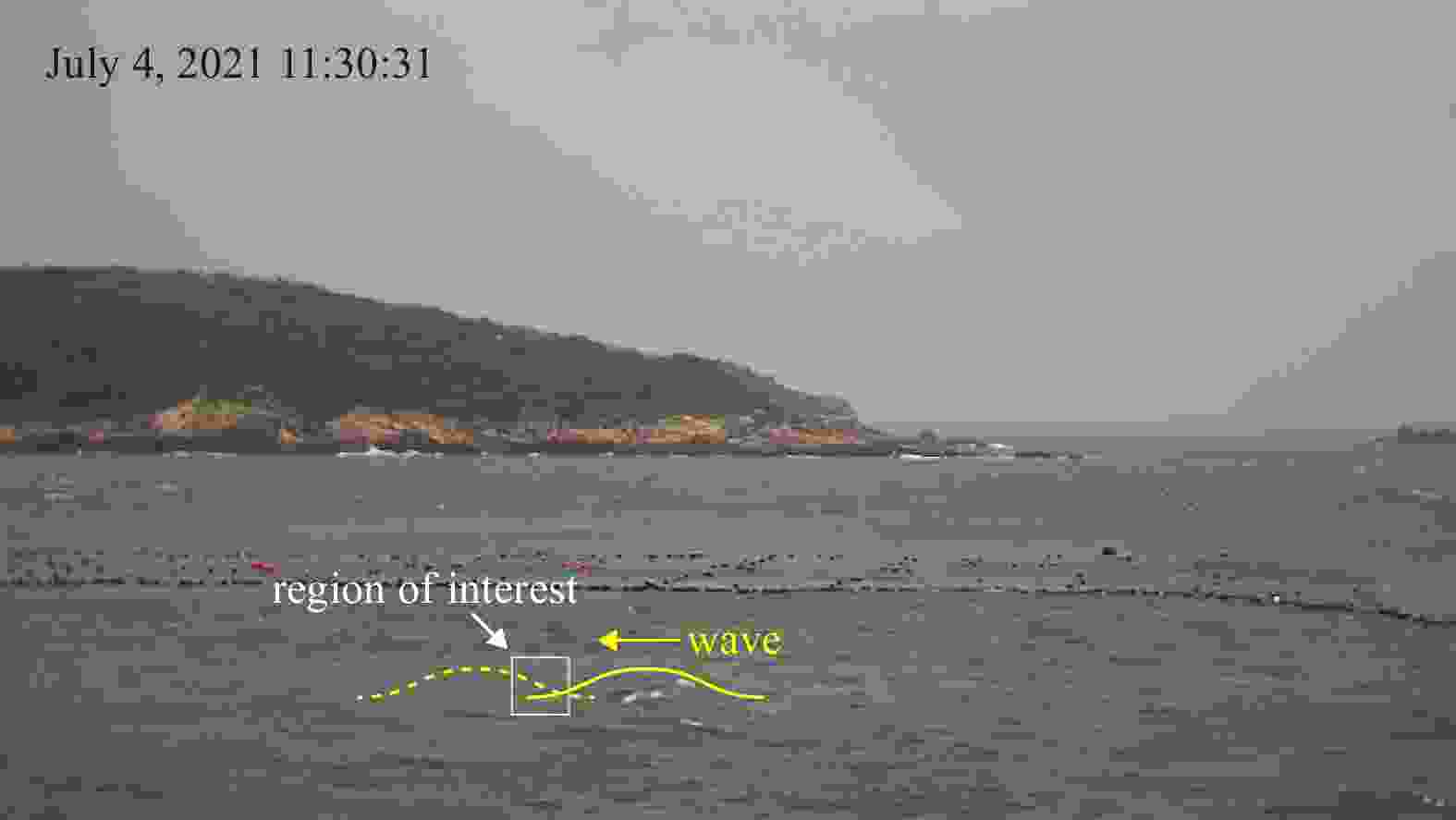
 下载:
下载:
